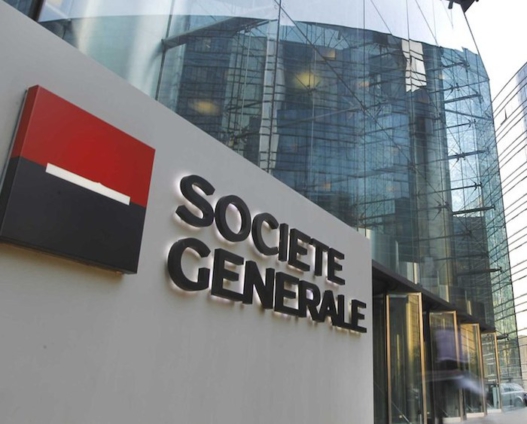The Societe Generale Ghana has been informed that Societe Generale Group which holds 60.22% of Societe Generale Ghana, has initiated a strategic move.
In a statement dated Thursday, May 9, 2024, the Group added that "If a concrete development were to be decided, a subsequent communication will be made at the appropriate time according to applicable legislation."
Managing Director of Societe Generale Ghana, Hakim Ouzzani, had earlier declared that the publicised information about the bank exiting the Ghanaian market is not coming from the Group Head Office in France.
Background
Fitch Ratings earlier projected that the exit of French bank, Societe Generale (SG) from Africa, will give pan-African banks significant space to grow, either organically or through mergers and acquisitions.
“This should stimulate competition and benefit local banking sectors despite some short-term challenges”, Fitch said.
Already, there are reports SG is moving out of Ghana due to issues of profitability and high regulatory demands in the financial sector by the regulator.
SG has announced the sale of Societe Generale Marocaine de Banques (SGMB) and its subsidiaries to the Moroccan conglomerate Saham Group on 12 April. This follows several African disposals by French banks in recent years.
In the past six months SG has also agreed the sale of some other smaller African subsidiaries, and launched a strategic review to dispose of its 52.34% stake in Tunisia-based Union Internationale de Banques. BNP Paribas, BPCE and Credit Agricole’s African presence has also decreased over the last 10 years and is now very limited. We expect further divestments in the next 12-24 months, especially if valuations are attractive to the selling banks.
Divested subsidiaries face several challenges as their parents’ risk appetite has been lower than local competitors’. In addition, the exit of highly rated foreign shareholders is often credit negative for subsidiaries. We placed SGMB’s National Ratings on Rating Watch Negative, signalling that upon completion of the sale we will no longer factor in potential support from SG, which is likely to result in a downgrade.
A lower rating, or the exit of a foreign shareholder, could make access to the global financial system and correspondent banks more difficult, potentially disrupting cross-border remittances, payments and trade finance activities. In many sub-Saharan markets where FX liquidity is tight, it could also make access to hard currencies more difficult without the FX liquidity lines that French parent banks typically provide to support trade finance activities. However, these are short-term hurdles and banks typically have good access to funding from development finance institutions.
“We see significant opportunities for local and regional banks in Africa despite the challenges. Some banking groups with pan-African ambitions should eventually gain enough scale to compete with long-established institutions. Vista Group agreed to acquire several subsidiaries (including some of SG’s) in sub-Saharan Africa in 2023, which would increase its African presence to 16 countries”.
Coris Bank, present in 11 African countries, finalised the acquisition of SG’s Chadian subsidiary in January, and is awaiting regulatory approval to acquire SG’s Mauritanian subsidiary. Vista and Coris are emerging as credible competitors for the well-established South African, Nigerian and Moroccan pan-African banking groups.
Increasing competition among pan-African banking groups should boost credit growth. French-owned African subsidiaries are often unable to target certain segments of the economy due to their parent bank’s conservative risk appetite, and they follow more stringent loan classification and provisioning policies than locally owned banks.
This can act as a drag on growth and profitability. Stricter capital management, with higher buffers over local minimum regulatory requirements, has also constrained subsidiaries’ lending. We expect credit growth to accelerate with the exit of French banks, albeit mainly in lower-risk segments, which will help preserve asset-quality metrics.
The French banks’ exit from African retail and commercial banking is slightly credit positive for them. They are refocusing on more mature retail banking markets in Europe and on activities such as insurance, leasing, and corporate and investment banking, where they can realise higher synergies. Reduced presence in Africa also aligns better with their conservative risk appetite and efforts to optimise risk-weighted assets under European banking supervision, which is tighter than the local supervision for their African peers. Increasing economic uncertainties and heightened geopolitical tensions in some African countries are also influencing their strategic reassessment.
Latest Stories
-
Actress Benyiwaa of ‘Efiewura’ TV Series is dead
2 minutes -
Ashanti Regional Chief Imam dies at age 74
27 minutes -
Africa Arts Network calls for tax reform to save Ghana’s theatre industry
39 minutes -
SSTN Ghana Chapter reaffirms commitment to economic growth under new leadership
45 minutes -
Inlaks strengthens leadership team with key appointments to drive growth across sub-Saharan Africa
2 hours -
Green Financing: What Ghana’s Eco-startups need to know
2 hours -
CHAN Qualifiers: Amoah confident of beating Nigeria
2 hours -
Governments deprioritising health spending – WHO
2 hours -
Lordina Foundation brings Christmas joy to orphans
2 hours -
Yvonne Chaka Chaka to headline ‘The African Festival’ this December
2 hours -
Nigerian man promised pardon after 10 years on death row for stealing hens
2 hours -
MGA Foundation deepens support for Potter’s Village
2 hours -
Galamsey: One dead, 3 injured as pit collapses at Nkonteng
3 hours -
Man, 54, charged for beating wife to death with iron rod
3 hours -
MedDropBox donates to UG Medical Centre
3 hours

